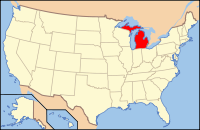Calhoun County, Michigan
| Calhoun County, Michigan | ||
|---|---|---|
|
||
 Location in the U.S. state of Michigan |
||
 Michigan's location in the U.S. |
||
| Founded | established 1829 organized 1833 |
|
| Named for | John C. Calhoun | |
| Seat | Marshall | |
| Largest city | Battle Creek | |
| Area | ||
| • Total | 718 sq mi (1,860 km2) | |
| • Land | 706 sq mi (1,829 km2) | |
| • Water | 12 sq mi (31 km2), 1.7% | |
| Population | ||
| • (2010) | 136,146 | |
| • Density | 193/sq mi (75/km²) | |
| Congressional district | 3rd | |
| Website | www |
|
Calhoun County is a county in the U.S. state of Michigan. As of the 2010 census, the population was 136,146. The county seat is Marshall. The county was established on October 19, 1829 and named after John C. Calhoun, who was at the time Vice President under Andrew Jackson, making it one of Michigan's Cabinet counties. County government was first organized March 6, 1833.
Calhoun County comprises the Battle Creek, MI Metropolitan Statistical Area and is included in the Kalamazoo-Battle Creek-Portage, MI Combined Statistical Area.
According to the U.S. Census Bureau, the county has a total area of 718 square miles (1,860 km2), of which 706 square miles (1,830 km2) is land and 12 square miles (31 km2) (1.7%) is water.
The Kalamazoo River oil spill occurred in July 2010 when a pipeline operated by Enbridge (Line 6B) burst and flowed into Talmadge Creek, a tributary of the Kalamazoo River. A six-foot break in the pipeline resulted in the largest inland oil spill, and one of the costliest spills in U.S. history. The pipeline carries diluted bitumen (dilbit), a heavy crude oil from Canada's Athabasca oil sands to the United States. Following the spill, the volatile hydrocarbon diluents evaporated, leaving the heavier bitumen to sink in the water column. Thirty-five miles of the Kalamazoo River were closed for clean-up until June 2012, when portions of the river were re-opened. On March 14, 2013, the Environmental Protection Agency (EPA) ordered Enbridge to return to dredge portions of the river to remove submerged oil and oil-contaminated sediment.
...
Wikipedia
